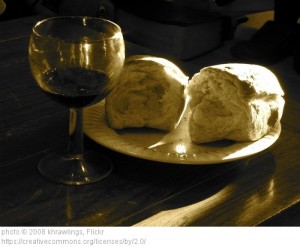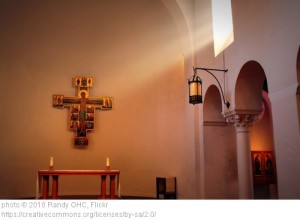As you know from my last post, I was devastated by World Vision’s reversal, under pressure, of a previous policy decision to welcome people in legal same-sex marriages as employees. Today’s post is less about the decisions themselves than how they made me feel about many of my fellow Christians—those at World Vision and those whose vocal opposition to same-sex marriage brought about World Vision’s reversal. I was angry. And I was really, really sad. (Still am.)
I am tempted to just sever my ties with Christians whose conservative theology and morals are so different than mine. I am tempted to fling bitter accusations at those whose ideology did such damage last week—damage to Christian unity, to hospitality and inclusion, and to the primary Christian call to serve the poor. I am tempted to surround myself with nice progressive Christians who see things the way I do, to stop putting energy into conversation with those whose Christianity looks so different than mine. I suspect that these temptations are not mine alone.
 I am proud to be an Episcopalian. I’m proud of our liturgy and prayer book, our progressive policies and radical hospitality. I worship alongside others who are equally proud of our liturgical, sacramental, “big tent” tradition. And I suspect that our love of the progressive Episcopal way of being Christian, combined with our bewilderment and even disgust with some other ways of being Christian, can lead us to a kind of Christian isolationism. We become uninterested in conversation with those who think and believe differently. We dismiss their theological and moral arguments out of hand. We put our heads down and do our work, our way, and pay no mind to those Christians whom we can’t understand or abide.
I am proud to be an Episcopalian. I’m proud of our liturgy and prayer book, our progressive policies and radical hospitality. I worship alongside others who are equally proud of our liturgical, sacramental, “big tent” tradition. And I suspect that our love of the progressive Episcopal way of being Christian, combined with our bewilderment and even disgust with some other ways of being Christian, can lead us to a kind of Christian isolationism. We become uninterested in conversation with those who think and believe differently. We dismiss their theological and moral arguments out of hand. We put our heads down and do our work, our way, and pay no mind to those Christians whom we can’t understand or abide.
There are certainly some who claim the label “Christian” whose actions and attitudes are so far removed from the life and ministry of Jesus Christ that we can, in good conscience, refuse to embrace them as fellow Christians. I’m thinking, for example, of Westboro Baptist Church founder Fred Phelps, who died last week. But while every movement and ideology has its share of blowhards and egotists, most Christians whose positions on gay marriage and other sociopolitical issues I find hard to accept are simply, like me and my progressive kin, trying their best to follow Jesus Christ. This was most apparent to me last week when I read a colleague’s interview with World Vision’s Rich Stearns after he announced the organization’s reversal. Some of what Stearns said still puzzles and troubles me. But while I find Stearns’s opinions and actions difficult to swallow, he’s not a villain. He’s a fellow Christian, trying to make decisions that are right for his organization and for our common faith. As much as I want to distance myself from Stearns and anyone who influenced and/or supported World Vision’s retraction, I can’t. They are my brothers and sisters in Christ. Just as we can’t choose our biological family, we can’t choose our Christian family. A commenter to last week’s post on the World Vision controversy wrote this:
All too often we forget that God calls us all to his table and that we don’t get to choose who he seats us next to. No one loves you like family and no one can break your heart like family.
For me, that was the truest thing that anyone said in response to this World Vision mess. God’s seating chart poses a challenge to all Christians. It is a challenge to the folks at World Vision, and those who spoke out so vehemently against their initial decision, to recognize that Christians in same-sex marriages are invited to sit at the table alongside those in traditional marriages. And it is a challenge to all of us, to continue building relationships with and listening to our fellow Christians—to honor God’s seating chart—even when they break our hearts.











